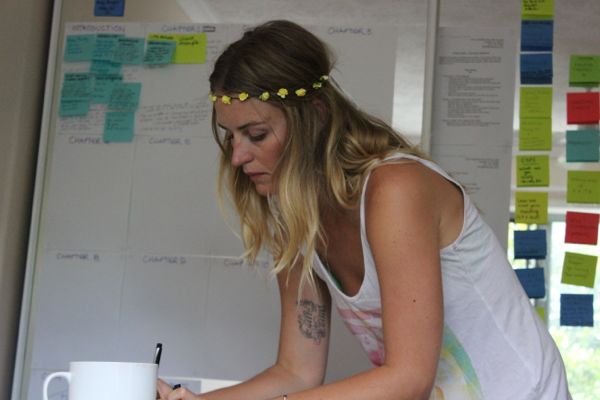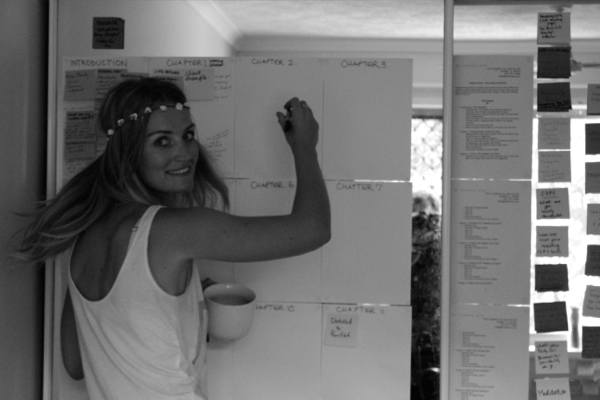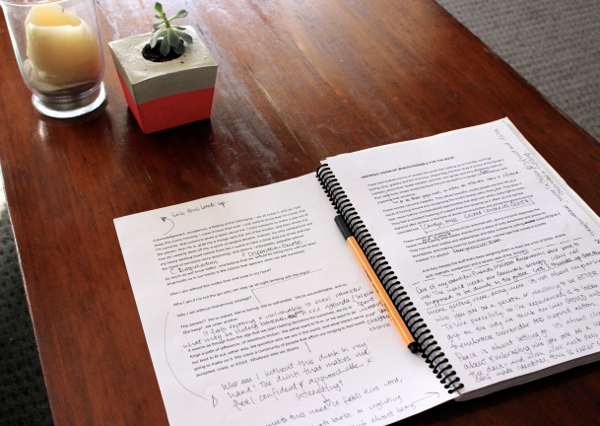 If like me, you consider yourself a visionary, there’s this little issue called The Finer Details, which tends to nip our limitless thinking in the butt. Dreaming big, going large on the vision, holding space for hope – ppfftt – that’s the easy stuff! But putting systems in place to support that – on something as large and fulfilling such as writing a book – that’s like putting the elephant in the room right? And is where us visionaries so often fall flat on our face.
If like me, you consider yourself a visionary, there’s this little issue called The Finer Details, which tends to nip our limitless thinking in the butt. Dreaming big, going large on the vision, holding space for hope – ppfftt – that’s the easy stuff! But putting systems in place to support that – on something as large and fulfilling such as writing a book – that’s like putting the elephant in the room right? And is where us visionaries so often fall flat on our face.
That’s why I adore what I’m about to share with you today: the plan that supports the dream of the aspiring writer. A framework for the creative at heart. A structure.
I was lucky enough to recently participate in a once in a lifetime opportunity called the The Writer’s Mastermind in Bali with Mastin Kipp, the founder of The Daily Love and two world-class teachers to deep dive into my own creativity.
Most of what you’ll read in this blog post is wisdom imparted from Kelly Notaras and Patricia Verducci – our mastermind writing coaches while we were in Bali. Kelly’s a Hay House Editor, and Pat’s a screenwriter, and they’re both worth their weight in gold, so you can rest assured that if you can feel a book rattling in your bones, this ain’t terrible advice to follow.
How To Write A Book – The Outline
Essential. Do not – under any circumstances – start writing a book without an outline (Mastin found out the hard way). How many chapters does your book have? What’s going to be the central theme or message in each of them? What case studies or stories can you use to strengthen the message? How will you transition to the next chapter? Do the introduction and conclusion have a link-in, full-circle effect? All handy questions that will help you craft a useful outline. Note: this will more than likely change as you begin writing, and that’s 100% okay. A few of my chapters merged to make way for new ideas, and many of the other girls in Bali experienced the same.
The First Draft
Put your white out away. Step awaayyyy from the backspace key. Leave all self-criticism at the door, and just effing write.
The first draft isn’t pretty. It’s quite literally a transfer of creative information from your body, to the page.
It’s impossible for me to express how frustrating it was to continue writing without editing, without making my sentences sing and paragraphs purr and my chapters connect seamlessly. Oh, if only.
More than anything, and I can only speak for myself here: the first draft is a test of faith. Faith in the process. Faith that, when the time is right (and that time is most certainly not now), you will know how to make the words pretty, how to restructure the paragraphs. Faith that you will find (and fix) what you missed the first time round.
Write without judgement. Write without judgement.
It’s a mantra that was on repeat in my mind, not only in Bali, but also once I returned home and immediately got stuck into Spirited 2.
Just get the damn bones out – the ideas, the general message, the stories – and make it glow later.
Brilliant writers barf it out, and then they work it out.
Writing a book takes not only discipline, but experimentation of routine. I mentioned in this post what my daily writing routine in Bali looked like – a 4am alarm being essential for me to feel as though I’d had a productive and progressive day (with only 23 full days to write a book, we were rather under the pump!). Back home in my Burleigh, my days roll out differently – I still rise early, but my waking hours are focused more on a nourishing morning routine, before I hit the books and computer at about 8am.
Kelly and Pat, and almost any writer ever known, will offer you this: WRITE EVERY DAY. For you, this might look like a commitment to 2000 words a day, or one hour of writing before the kids wake up, or stream of consciousness journalling every morning.
With my business model, writing everyday isn’t a problem – my days are filled with writing blog posts, eBooks, emails as well as marketing copy, but I cannot for the life of me imagine fitting my book in amongst the rest of my life (not at this stage, anyway), which is why I’m heading to Byron tomorrow for 8 days of creative caving and body detoxing. My challenge since returning from Bali has been intuitively compartmentalising my days into boxes of What Projects Need What From Me To Feel Nourished.
My book was born in a retreat environment: a space in which everything I did – what I ate, how I moved my body, how long I meditated for – was in support of it’s birth. It feels right in my body to create a similar space for Draft Two, in Byron.
So, I would alter Pat and Kel’s initial suggestion and say: Yes, write everyday, but if you feel in your heart that you need to create a special place to invest the time and energy into your book, then do that. Create and schedule sacred containers: periods of time where you can clear your calendar and get away (or not – perhaps all you need is an at-home, switch-off retreat), draw on all the devotion you can muster and give it everything you’ve got.
 After you’ve finished your draft (and you’ll know you’ve finished because you’ll feel totally spent; like the thought of writing another word would be akin to getting your teeth pulled out), it’s time to close your notebook, close your lap top, push them to the side, breathe, and acknowledge your efforts. Note: Most of us had to be told in Bali something along the lines of this: Girl, you’re finished. You’ve written everything you can possibly write here. Chill now, and enjoy yourself. So here’s where I remind you that the First Draft isn’t perfect – no where near it. When you’re body says I’m done with this, I’m drawing on empty, listen to it. It knows.
After you’ve finished your draft (and you’ll know you’ve finished because you’ll feel totally spent; like the thought of writing another word would be akin to getting your teeth pulled out), it’s time to close your notebook, close your lap top, push them to the side, breathe, and acknowledge your efforts. Note: Most of us had to be told in Bali something along the lines of this: Girl, you’re finished. You’ve written everything you can possibly write here. Chill now, and enjoy yourself. So here’s where I remind you that the First Draft isn’t perfect – no where near it. When you’re body says I’m done with this, I’m drawing on empty, listen to it. It knows.
Celebrate (in hindsight, I wish I had of spend a little more time hanging out here). Give the book – and you! – at least a week of breathing space; enough so that you feel excited to go back to it. I needed a little more than a week, probably two and a half, and not because I despised it or was afraid to revisit it, I was simply exhausted after giving a whole month of my life to it.
When the time is right and you feel called to return to the book, here’s what Pat and Kel recommend:
1. Cold read through.
Print out your draft, and read it start to finish over the course of a few days, without making any notes or edits. Again, this is challenging. The mantra of ‘Write with non judgement,’ becomes: ‘Read with non-judgement.’ Once you’ve finished your read through, you’re going to become somewhat of an emotional engineer and take what’s called Global Notes. Answer these questions:
-
What works? What’s great about my draft? Followed by…
-
What needs attention?
This is not a time to look at grammar and spelling. That’s a whole different process, called editing! :)
These questions will help you really see your book:
-
Is the organisational structure working?
-
Is the tone inviting and not preaching?
-
Does the reader know where they’re at in their own journey?
-
Am I on point and consistent?
-
Is there subheadings throughout the chapter?
-
4. Is the reader set up to integrate? For example: Here’s an exercise for you to try, or, Here are some roadblocks that I came up against on my own journey…
5. Consistency. Are my chapter lengths consistent? And if they’re not, does it still work?
6. Is it both informative and entertaining?
My global notes looked something like this:
-
More humour
-
This is a book about embodying peace, so put a little more emphasis on the light (it’s not all dark).
-
Cross out everything that’s irrelevant. Let it go.
-
Review and restructure each chapter: Beginning, middle, end.
-
Explore these extra topics: X, X, X and X
2. Second read through
This time, you’re reading through with a pen in your hand, taking notes, making scribbles, and jotting down ideas. Again, you’re not even giving a sideways glance to spelling and punctuation – the priority is the strength of the story.
Once you’re finished, you’ll have a printed draft full of graffiti, which might look something like this:
 This is a left-brained, analytical, dissect-and-put-back-together process, and I totally loved it! It was so fun to really get in there and see how I could restructure in the name of flow, where I could expand upon a story, add a quote, delete whole paragraphs.
This is a left-brained, analytical, dissect-and-put-back-together process, and I totally loved it! It was so fun to really get in there and see how I could restructure in the name of flow, where I could expand upon a story, add a quote, delete whole paragraphs.
Now, you’re ready to start on your second draft. And, my sweet friends, this is exactly where I’m at. Over the next eight days in Byron, my graffiti draft will be my bible; my divine document that I’ll be referring to hundreds of times per day as I make the changes to the book that my scribbly handwriting tells me to.
I’ll go through this process a couple of times – printing, taking notes, adjusting, until finally I’ll give it what’s called a line edit: grammar, spelling, polishing.
And here’s the nugget, the piece of advice that quite literally left me stumped: When you get your book to a point where you think it’s brilliant, when you’ve given it your all, then and only then, hand it over to an editor (ensuring that you get the most bang for your buck), and when you make that handover, accept in your heart that in that moment, you are only 20% of the way there.
20%
As Pat and Kelly told us over and over again: The lion’s share of the writing is in the re-writing.
If I can wrap all of this up in one potent message, it would be this: do not edit your draft as you are writing it. When you’re writing a book this is saboteur behaviour at it’s most insidious. A first draft is no place whatsoever for perfectionism. With each and every edit, you’ll be taken away from the freeing feeling of completion, of finishing a milestone, of breaking through one hell of an upper limit. The saboteur in all us writers would rather we form the perfect paragraph then finish. There is time to make it beautiful, my friends. And that time is later.
Be a brilliant writer, and barf it out.
Thank you so much for making it all the way down here! I so enjoyed writing this post for you and I hope this inspire you to write your own book. It’s my hope that this will be one of those posts that you bookmark and return back to time and time again.
I’d be so grateful if you’d share this post using the buttons below so that all those visionary writers out there can feel a little more supported by this framework!
With Bliss. x
PS: Those pictures of me with a mammoth cup of tea and thousands of post it notes? That’s what putting together your outline might look like. Or not. Whatevs. ;)
PPS: Wanna write a book in 2014? Grab our Spirited 2014 Companion – it’ll help you smash through resistance, cultivate confidence, and change your relationship to failure.



“Barf it out”
Word.
Represent ;)
This is awesome … thank you ! XO
You’re welcome babe!
Such a brilliant post Tara, I loved reading it and learnt so much from it!
This is brilliant babe!! Love sharing this journey with you XX Rock on sista!!
Definitely saving this for when I finally get around to reading my first draft! A beautiful, gentle reminder of what’s to come. Love this Tara! x
I wrote a book doing everything opposite to what you said here (editing before done, no outline, etc.). It is being published next year.
That said, the process was kind of like walking in the dark since for most of it I was just kind of writing waiting for the words to scream stop but at the same time not letting the story just flow. A challenge for sure.
This next go round, I’m going to just write, like you suggest and not edit a single word before it’s done. I’ll also have to sit on my hands not to edit during the first read through but I’ll give it a go. Lots of wisdom you’ve shared here and even though my first thought was, “heck no, I could never do that,” I’m betting that means I need to try this method.
As always, thanks for spreading love and information.
Thank you so much for this post Tara. HEAPS of practical advice (and ps can’t wait to read your book when it’s ready) XX
Yes! I’m up to the cold read through/graffiti part (I had to cut it shorter than i wanted because of outside forces) but it’s so amazing to go through and be like: ‘I wrote this and it’s actually good!’ Ahhh! Good luck with your second draft, Tara!
And good luck to you Mandi!
So much goodness jam-packed into this – thank you! While writing a book isn’t something that’s calling my name at this time, needing to put supportive systems into place resonates with the projects I’ve got on the go now. I love the reminder of asking ‘what projects need what from me to feel nourished’ and am inspired to apply the above to my blog posts and smaller eBooks – get the bones out, pop my emotional engineer hat on and then make it glow! I’ve carved out time in over the Chrissie break to dive into Spirited and am so looking to reading your book when you publish. Huge congrats on all you have achieved! xx
So awesome. So inspiring. Thank you for sharing Tara! ‘What projects need what from me to feel nourished’ has really hit home for me, perfect timing. Thank you for being so open, generous and kind. have an awesome time at your retreat, so excited for your gift to the world xxx
LOVE this post thanks Tara x
Tara, this is a brilliant post, mostly because of how useful it is across so many fields. I’ve learnt to employ many of the same techniques in my academic writing, and I really think this systems works for all sorts of writing – fiction, non-fiction, academic, spiritual, whatever. Great work!
You’re amazing! Just what I needed to hear as always xx
Ahhhhh thank you SO MUCH, Tara! I love that you poured so much energy, time and thought into this post with all of the juicy behind-the-scenes stuff and some really home-hitting truths. I’m so excited for you to dive into your Byron retreat and your second draft. Go you!
Amazing post. Have devoured, copied, pasted and then saved it to my ‘book’ file on my desk top. Absolutely love the process you’ve outlined and can’t wait to see what you’re putting out to the world as a result. Go you good thing!
Amazing Tara, I love this. My biggest hurdle is barfing it out, but as you say… “A first draft is no place whatsoever for perfectionism.” There will always been a second draft. Thank you.
This is so truthful Tara. The best piece of advice I was given by a writing guru was not to read back over what I had written so far in a first draft. The desire to peruse back through our work is overwhelming, however the moment we read back over what we have done, our inner critic rears its head and we polish madly, inhibiting our flow. What should be a freeing process (albeit marathon-esque in the case of a book!) of just getting the damn thing onto the page becomes a slow and painful nitpick where we feel smothered by our own words. Great advice that I can see you too have been given!
Just wondering if you have any details about the writer’s retreat you’re attending in Byron?
Cheers! x
Great post! Sounds like such an incredible process, cannot wait to read the finished product!!
Thank you for this Tara.
Love it Tara – thanks so much for sharing :-)
Oh yes – this will most certainly be bookmarked and read over abs over again! Thank you beautiful. This has been my call to arms. Xx
Beautiful advice Tara! It is one of my biggest dreams to write a book (fiction) and I’ve played around with starting so many times. I now know my next step :)
So cool to see your writing process, Tara. And the insight makes it much less daunting for those of us who have a book lingering somewhere inside! So admire your… dedication, I guess I would call it, to your calling and craft. That you honor what you hear and make it so. I look forward to your posts, for the writing, the learning… and of course, can’t wait to read your baby when it’s here! Lucie x
I loved this – I love to write but get stuck when I overthink it. I love the ‘barf it out’. Good luck on the retreat and cannot wait to read your book when it comes out!
Great advice, thanks for sharing! I loved reading Spirited and I’m looking forward to your next book X
Loved reading this Tara, thank you for sharing. As I’ve just closed on my second ebook this year, I am slightly relieved that I’ve gone through much of this process without having a clue what I was doing. Just trusting in the soul’s work.
I’ve also learned what I can do much better with on the next one that is within me.
Thanks Caz!Would love to know how this framework goes for you if and when you use it xx
This post is freaking amazing, Tara! So many practical and actionable ideas that, even just reading through them, make SO much sense. Like, why didn’t I know this already? And although I have every intention of writing a book, I can already apply some of your tips to blog writing and eBook creation time.
Love it. Rock on.
Enjoyed reading this post Tara. Sounds like it was an amazing experience in Bali. I laughed when I saw the picture of you with the post it notes, that is exactly what my room looked like yesterday as I was reordering pages from my meditation ebook that’s coming out next year.
Good luck with the second draft!
Happy New Year.
Elise
Cheers Elise!
HNY to you too xxx
I loved this and am currently in the midst of my first book also.
I fully recommend to anyone that is having trouble ‘barfing’ it out so to speak, without editing, grab yourself a couple of toddlers and try then. Trust me…you’ll be seeing little red and green squiggles up all over the place and plough straight on hoping no-one vomits or cries for at least another 10 mins.
This does NOTHING for being able to immerse your whole freakin self into the project for an extended period of time though, so I am invested in grabbing, (paying or bribing or stealing) a few days all to myself to become my book in the next month. 1st Draft deadline is 31 Jan.
To all you amazing babes doing this too. GOOD LUCK. I am sure your work will be heaven on a page and to Tara, thanks again. XX
Thank you for sharing such lovely advice, Tara! It is indeed my goal to write and publish a book this year. I was writing this morning and sort of had my own epiphany about what you said – just writing and not editing at all until you feel you’ve completed your work. I had only put that mindset towards a chapter, but it’s good to hear that you’re encouraging that process for the entire book. Makes my goal feel so much more attainable! xo
Best of luck birthing your book baby Kim xx
Wow! This post is brilliant Tara. I have had two books that have come to me late this year since beginning meditation and practicing presence. However, I have been lost and unsure of where to start. Priceless advice. Thanks babe! xo
This is flipping excellent Tara!
Thankyou so much. I am so eager to sit down with you for a full day on the 4th January to get y own started and out to the world! =)
Quick question, if you do get this comment, as I know it’s a late entry:
When re-writing… as in, from the graffiti’d printed out draft… do you actually, physically re-write the whole thing? I’m wondering if I’d be able to resist slipping into edit mode if I were to duplicate the draft and work with something that was already there… but then again.. re-writing is so much more work… Or is it?
Curious, h x x
Hey beautiful girl,
The lion’s share is definitely in ‘re-writing.’
But no – you certainly don’t have to re-write EVERYTHING. There are whole paragraphs in my book that have remained unchanged from the draft, but at the same time, there’s also whole chapters that never existed the first time round.
When you start re-reading your draft, you’ll begin to get an idea about what needs to be changed, expanded upon, removed. (Always good to give yourself a little breathing room between drafts 1 and 2.
Can’t wait to go deeper into this ! xo
Love you x